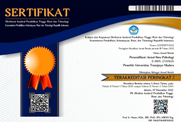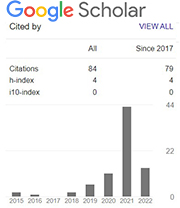Pengaruh Self-Compassion terhadap Tingkat Flourishing pada Tenaga Kesehatan di Indoenesia
Abstract
Keywords
Full Text:
PDF (Bahasa Indonesia)References
Arif, I. S. (2016). Psikologi positif: Pendekatan saintifik menuju kebahagiaan. Gramedia Pustaka Utama.
Awaliyah, A., & Listiyandini, R. A. (2017). Pengaruh rasa kesadaran terhadap kesejahteraan Psikologis pada mahasiswa. Jurnal Psikogenesis, 5(2), 90–101.
Coffey, K. A., Hartman, M., & Fredrickson, B. L. (2010). Deconstructing mindfulness and constructing mental health: Understanding mindfulness and its mechanisms of action. Mindfulness, 1(4), 235–253. https://doi.org/10.1007/s12671-010-0033-2
Dong, Y., Dong, Y., Mo, X., Hu, Y., Qi, X., Jiang, F., Jiang, Z., Jiang, Z., Tong, S., Tong, S., & Tong, S. (2020). Epidemiology of Covid-19 among children in China. Pediatrics, 145(6). https://doi.org/10.1542/peds.2020-0702
Fong, M., & Loi, N. M. (2016). The mediating role of self-compassion in student psychological health. Australian Psychologist, 51(6), 431–441. https://doi.org/10.1111/ap.12185
Juniartika, R., Sari, E. Y. D., & Widiana, H. S. (2020). Efektivitas Pelatihan Kebermaknaan Kerja untuk Meningkatkan Keterikatan Karyawan pada Perawat. Mediapsi, 6(1), 26–36. https://doi.org/10.21776/ub.mps.2020.006.01.4
Majore, C. E., Kalalo, F. P., & Bidjuni, H. (2018). Hubungan kelelahan kerja dengan kinerja perawat di instalasi rawat inap RSU Pancaran Kasih Gmim Manado. E-Journal Keperawatan, 6(2), 1–6.
Neff, K. (2011). Self-compassion: Stop beating yourself up and leave insecurity behind. Hodder and Stoughton.
Neff, K. D. (2003). The Development and validation of a scale to measure self-compassion. Self and Identity, 2(3), 223–250. https://doi.org/10.1080/15298860309027
Neff, K. D., Rude, S. S., & Kirkpatrick, K. L. (2007). An examination of self-compassion in relation to positive psychological functioning and personality traits. Journal of Research in Personality, 41(4), 908–916. https://doi.org/10.1016/j.jrp.2006.08.002
Neff, K., & Germer, C. (2018). The mindful self compassion workbook: a proven way to accept yourself, build inner strength, and thrive. The Guilford Press.
Pallant, J. F. (2000). Development and validation of a scale to measure perceived control of internal states. Journal of Personality Assessment, 75(2), 308–337. https://doi.org/10.1207/S15327752JPA7502_10
Permana, H., Harahap, F., & Astuti, B. (2016). Hubungan antara efikasi diri dengan kecemasan dalam menghadapi ujian pada siswa kelas IX Di Mts Al Hikmah Brebes. Hisbah: Jurnal Bimbingan Konseling Dan Dakwah Islam, 13(2), 51–68. https://doi.org/10.14421/hisbah.2016.132-04
Pinggian, B., Opod, H., & David, L. (2021). Dampak psikologis tenaga kesehatan selama pandemi Covid-19. Jurnal Biomedik : Jbm, 13(2), 144–151. https://doi.org/10.35790/jbm.13.2.2021.31806
Purba, S. D., Chaterine, C., Hardjono, S., & Clarissa, B. (2019). Psychological meaningfulness and work engagement effect on doctor’s job satisfaction. Jurnal Dinamika Manajemen, 10(2), 229–239. https://doi.org/10.15294/jdm.v10i2.20835
Rosyanti, L., & Hadi, I. (2020). Dampak psikologis dalam memberikan perawatan dan layanan kesehatan pasien Covid-19 pada tenaga profesional kesehatan. Health Information : Jurnal Penelitian, 12(1), 107–130. https://doi.org/10.36990/hijp.vi.191
Sabiq, Z., & Miftahuddin, M. (2017). Pengaruh optimisme, dukungan sosial, dan faktor demografis terhadap kesejahteraan subjektif pada perawat. Jurnal Pengukuran Psikologi Dan Pendidikan Indonesia (JP3I), 6(2), 183–196. https://doi.org/10.15408/jp3i.v6i2.9174
Satici, S. A., Uysal, R., & Akin, A. (2013). Investigating the relationship between flourishing and self-compassion:A structural equation modeling approach. Psychologica Belgica, 53(4), 85–99. https://doi.org/10.5334/pb-53-4-85
Seligman, M. (2011). Flourishing a visionary new understanding of happiness and well-being. Simon & Schuster.
Solon, M., Madu, Y. G., Tolidunde, M., & Megawati, M. (2021). Dampak beban kerja terhadap tingkat stres pada tenaga kesehatan selama masa pandemi Covid 19. Jurnal Keperawatan Florence Nightingale, 4(2), 94–101. https://doi.org/10.52774/jkfn.v4i2.74
Soysa, C. K., & Wilcomb, C. J. (2013). Mindfulness, self-compassion, self-efficacy, and Gender as predictors of depression, anxiety, stress, and well-being. Mindfulness, 6(2), 217–226. https://doi.org/10.1007/s12671-013-0247-1
Stallman, H. M., Ohan, J. L., & Chiera, B. (2017). The role of social support, being present and self-kindness in university student well-being. British Journal of Guidance and Counselling, 46(4), 365–374. https://doi.org/10.1080/03069885.2017.1343458
Sugianto, D., Suwartono, C., & Susanto, S. H. (2020). Reliabilitas dan validitas Self-Compassion Scale versi bahasa Indonesia. 2(2), 117–191. https://doi.org/10.24854/jpu02020-337
Sugiyono, D. (2013). Metode penelitian kuantitatif, kualitatif, dan tindakan. Alfabeta.
DOI: https://doi.org/10.21107/personifikasi.v14i1.18448
Refbacks
- There are currently no refbacks.
Copyright (c) 2023 Yolina Njotowibowo, Agustina Engry

This work is licensed under a Creative Commons Attribution 4.0 International License.


Personifikasi by Universitas Trunojoyo Madura is licensed under a Creative Commons Attribution 4.0 International License.










